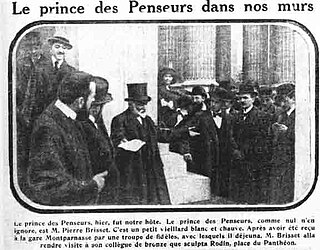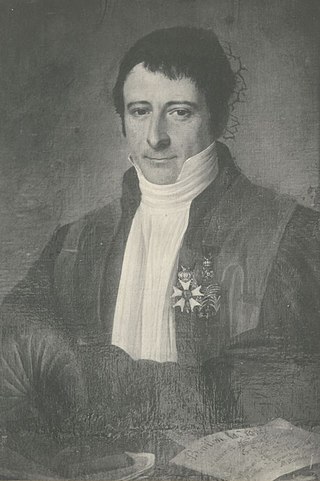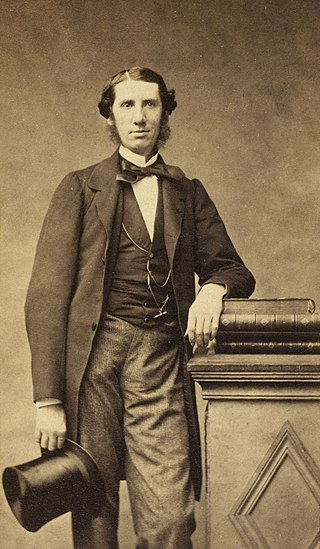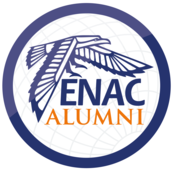In computational intelligence (CI), an evolutionary algorithm (EA) is a subset of evolutionary computation, a generic population-based metaheuristic optimization algorithm. An EA uses mechanisms inspired by biological evolution, such as reproduction, mutation, recombination, and selection. Candidate solutions to the optimization problem play the role of individuals in a population, and the fitness function determines the quality of the solutions. Evolution of the population then takes place after the repeated application of the above operators.

In computer science, evolutionary computation is a family of algorithms for global optimization inspired by biological evolution, and the subfield of artificial intelligence and soft computing studying these algorithms. In technical terms, they are a family of population-based trial and error problem solvers with a metaheuristic or stochastic optimization character.

The University of Toulouse is a community of universities and establishments (ComUE) based in Toulouse, France. Originally it was established in 1229, making it one of the earliest universities to emerge in Europe. Suppressed during the French Revolution in 1793, it was refounded in 1896 as part of the reorganization of higher education. It was finally abolished in 1969, giving birth to the three current universities: Toulouse 1 Capitole University, University of Toulouse-Jean Jaurès and Toulouse III - Paul Sabatier University. The ComUE in the Toulouse region was known as Federal University of Toulouse Midi-Pyrénées. On January 1, 2023, the university was renamed as the University of Toulouse.

École nationale de l'aviation civile (ENAC) is one of 205 colleges accredited to award engineering degrees in France. ENAC is designated as a grande école by the Conférence des Grandes écoles (CGE), a non-profit organisation which certifies and monitors grandes écoles. ENAC was founded on 28 August 1949 to provide initial and continuing education in the field of civil aviation. The school is an établissement public à caractère scientifique, culturel et professionnel, and operates under the oversight of the Ministry of Ecological Transition. Affiliated with the University of Toulouse and Aerospace Valley, it is one of the five founders of France AEROTECH.

Jean-Pierre Brisset was a French outsider writer.

TBS Education, formerly Toulouse Business School and Groupe ESC Toulouse, is a triple crown business school founded in 1903 by the Toulouse Chamber of Commerce and Industry. This highly selective grande école offers several types of training ranging from Bachelors and Masters in the field of management, including the most prestigious of them called the "Grande Ecole" Program (PGE), and a joint DBA with the University of Toulouse, Toulouse School of Management. It holds triple accreditation EQUIS, AACSB and AMBA and is a member of both the Federal University of Toulouse Midi-Pyrénées and the Conférence des grandes écoles (CGE). It offers business courses in English, French, and Spanish to over 7,000 students, many international, trained each year in its initial and continuing training programmes, and has business schools located in Toulouse, Paris, Barcelona, and Casablanca. Research is focused on emerging sectors, the school has developed two clusters: the first dedicated to Artificial Intelligence and data analysis, the second to aerospace mobility.
Antoine Schmitt is a French contemporary artist, programming engineer and designer.

Fred Glover is Chief Scientific Officer of Entanglement, Inc., USA, in charge of algorithmic design and strategic planning for applications of combinatorial optimization in quantum computing. He also holds the title of Distinguished University Professor, Emeritus, at the University of Colorado, Boulder, associated with the College of Engineering and Applied Science and the Leeds School of Business. He is known for his innovations in the area of metaheuristics including the computer-based optimization methodology of Tabu search an adaptive memory programming algorithm for mathematical optimization, and the associated evolutionary Scatter Search and Path Relinking algorithms.

Victor Joseph Jean Ambroise Ségoffin was a French sculptor.
Yves Stourdzé was a French sociologist. He studied technical and institutional conditions for innovation and how acceptable the effects of these are on society. He has also produced one of the most pertinent analyses of the phenomenon of informatization.

Edme-Jean Baptiste Bouillon-Lagrange was a French chemist and pharmacist. He was a professor of chemistry at the Ecole de pharmacie of Paris, later serving as director of the school.

Auguste Houzeau was a French agronomist and chemist.

Jacques Villiers was a French aerospace engineer and public servant. He was the founder of the Centre d'études de la navigation aérienne and co-founder of the CAUTRA system, the computer system of the French air traffic management.
Marc Émile Fouad Houalla is a French public servant. From 28 November 2008 to October 2017, he was the director-general of the École nationale de l'aviation civile . From November 2017 to February 2018, he was the Managing Director of Paris-Orly Airport. In February 2018, he was appointed Deputy Executive Officer, Chief Officer of Paris-Charles de Gaulle Airport.

ENAC Alumni is a nonprofit organization, alumni association created in 1987, and registered in Toulouse, Midi-Pyrénées. A key founder and former vice president of the association was Robert Aladenyse who dedicated his career to the ENAC alumni. Each year, the Robert Aladenyse Award recognizes the best internships of the year.
Jean-Louis Dessalles is a French computer scientist and researcher in artificial intelligence and cognitive science, professor à Télécom Paris (Paris). He is best known for his contributions to the Simplicity theory and for his original theory about a possible political origin of language.

Jean-François Gardeil is a French baritone and theatre director. He is also the founder and artistic director of the Chants de Garonne.
The biennial Artificial Evolution (AE) conference is held in France every two years, in early fall. The Parallel Problem Solving from Nature (PPSN) conference is held at the same period, but even years. EA is dedicated to techniques that simulate natural evolution. Proceedings of AE are published by Springer-Verlag in their LNCS serie.
Anne Auger is a French numerical analyst and computer scientist interested in benchmarks and performance analysis of black-box methods for numerical optimization. She is a director of research for the French Institute for Research in Computer Science and Automation (Inria), and the leader of RandOpt, the Randomized Optimization team at the Inria Saclay research center.












